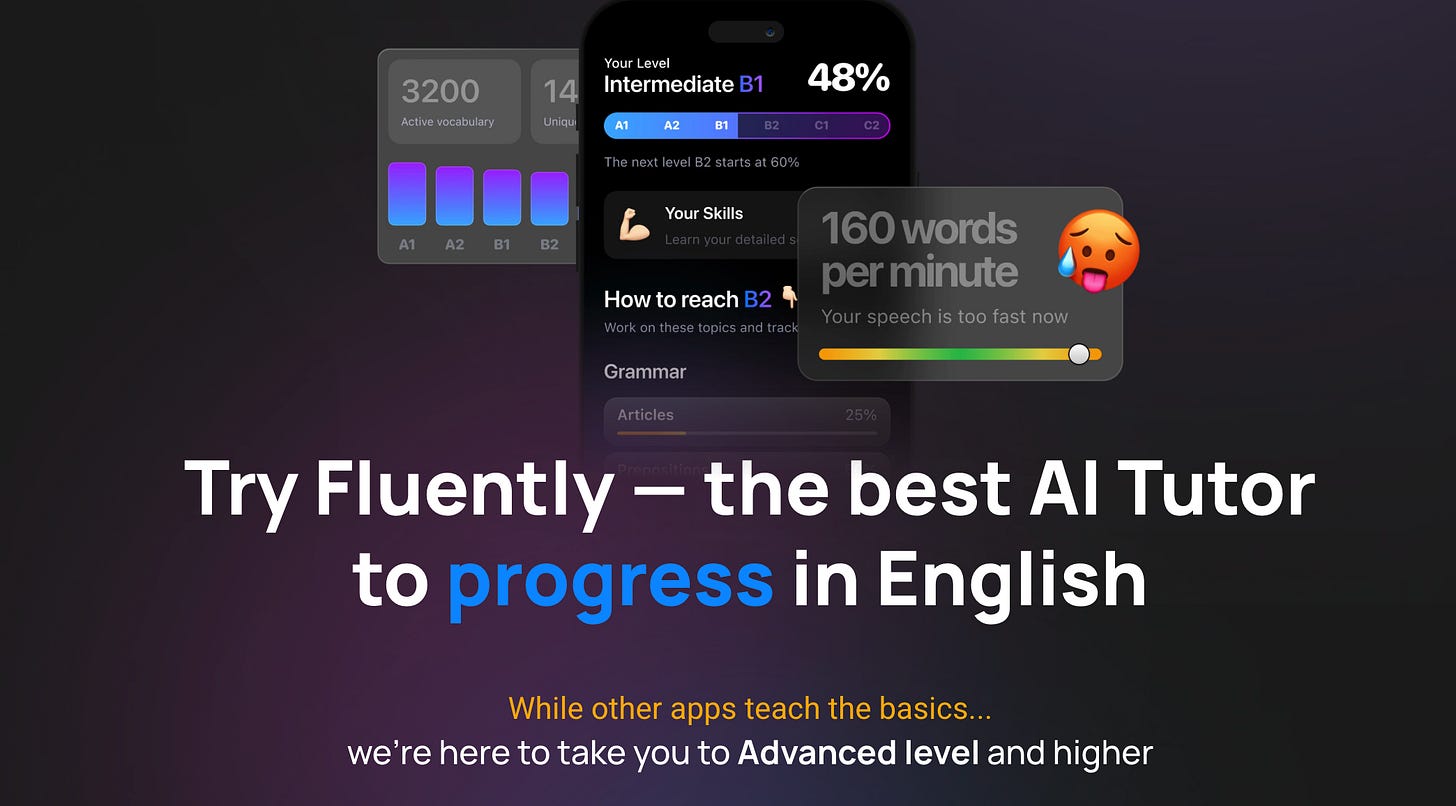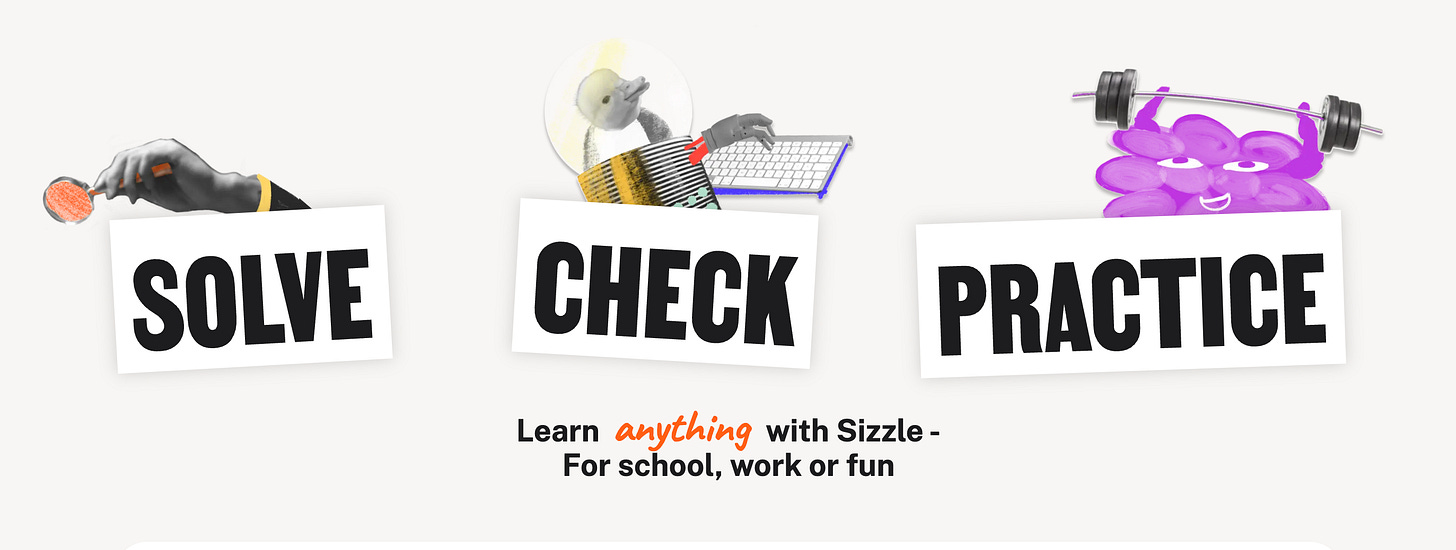Better Together
Today's featured startup is helping make everyone a native speaker.
Project Overview
Fluently has created an AI assistant designed to improve the spoken language skills of professionals who, due to the nature of their work, have to communicate in a non-native language.
The key feature is that the training happens during work — specifically, during the video calls that have become a daily routine for most professionals.
All it takes is installing the Fluently app on your computer, and it starts listening to what you say and how you say it during calls. After each video call, the app gives you feedback on how well you spoke.
No special integrations or bots are required to connect Fluently to video conferencing platforms, so it works with pretty much any video call tool out there.
Importantly, the app only records and analyzes your speech — not the other participants — so it doesn’t require anyone else’s permission.
Each call’s analysis is saved in Fluently, so you can review your performance, track your progress over time, and revisit any specific conversation to practice improvements.
The AI highlights issues directly in the transcribed version of your own speech, making it easy to see mistakes in context.
It flags things like mispronunciations and immediately offers an option to practice the correct version on the spot.
Fluently also tracks filler words and will gently call you out if you say “like,” “um,” or “you know” a little too often.
One particularly smart feature for real-world fluency is how the app suggests better word choices — alternatives a native speaker might use instead. In future versions, we might see this expand to include phrasal verbs, idioms, and set expressions — which are key to sounding natural in any language.
There’s no mention (yet) of grammar correction, but odds are that’s coming soon.
Each call ends with a summary of your performance, and the AI estimates your current language level using a familiar scale — for example, “C1 – Advanced.”
And if you don’t have any meetings lined up but still want to practice speaking? You can hop on a call with the AI and deliver a startup pitch, rehearse a client presentation, or practice a talk for colleagues — anything you like.
While individuals can use the app on their own, Fluently is clearly focused on winning over startups and companies with international teams who want to improve internal communication — at least in English, for now.
Fluently was founded in summer 2023, and it just made it into Y Combinator’s Winter 2025 batch. They launched the platform a few days ago.
From the looks of it, they’ve raised more than just the usual $500K from YC — another fund seems to be backing them too.
What’s the Gist?
We’ve already seen plenty of AI-powered language learning apps. But what makes Fluently stand out is not just that it helps people improve their speaking skills — it’s that it does this as part of their real workday.
Another startup, Swap Language, is doing something similar: it created a platform where employees from different countries can learn the company’s primary language of communication together. They raised €2M to scale that idea.
More broadly, traditional education often runs into the same problem — people study things “just in case.” And that usually happens for two reasons.
First, they’re learning something that isn’t useful right now — like picking up a foreign language for a future trip abroad. The motivation is weak, there’s no real practice, and the result is half-hearted learning that often fizzles out.
Second, some educators believe their job is to pack as much knowledge as possible into learners’ heads. But without opportunities to apply that knowledge, it remains abstract theory — and by the time students actually need it, they’ve forgotten it.
That’s why one of the strongest trends in modern education is learning through practical activity:
– Learn what you can apply right now
– Learn what you’re currently struggling to do
A crucial part of this approach is breaking knowledge into small, actionable pieces tied directly to your immediate or upcoming tasks. This is often called microlearning.
But it’s worth noting: microlearning is a method — not a philosophy. If you feed learners irrelevant knowledge in small pieces, it’s still not going to help.
And this idea applies to more than just languages — it’s relevant to all kinds of skills, including professional development.
First, there’s Cloverleaf, a startup that raised $15M for its automated coaching platform for corporate employees. Cloverleaf sends regular bite-sized lessons on communication, teamwork, and other soft skills — tailored to match what each person is working on. For example, it can scan your calendar and send you helpful insights based on the topic or purpose of your upcoming meetings.
Then there’s Sizzle, a homework assistant for high school and college students. They raised $7.5M in their first round.
If Sizzle were just about speeding up homework, it would hand over the right answers right away. But its real goal is to teach during the process. Because homework is hands-on activity — and if a student hasn’t learned something yet, the app helps them learn it right there while doing the assignment.
That brought back memories of university life — where lectures gave you theory, and solving the problems was left for homework. And let’s be honest — many of us struggled with that.
It’d be interesting to flip that model: what if lectures and seminars were used only to solve problems, while the underlying theory was studied independently at home?
Key Takeaways
The first insight from today’s story: if you want your employee to learn something, teach it in the context of real work — while solving real problems.
And if you want them to teach themselves, give them a task that forces them to pick up new skills along the way. You’ll quickly see who’s ready to grow… and who’s not.
So, the bigger trend is this: creating platforms that support this kind of real-world, activity-based learning.
Today, Fluently has embedded language learning into routine video calls at work. Sizzle, as we discussed, embedded learning into the process of doing homework.
The next big question is: what else could be learned — and where could it be embedded?
That’s the kind of question that might just turn into your own idea for a new edtech platform.
Company info:
Fluently
Website: https://getfluently.app/
Last funding round: $500K, 01.12.2023
Total funds raised: $500K+ after 1 round












